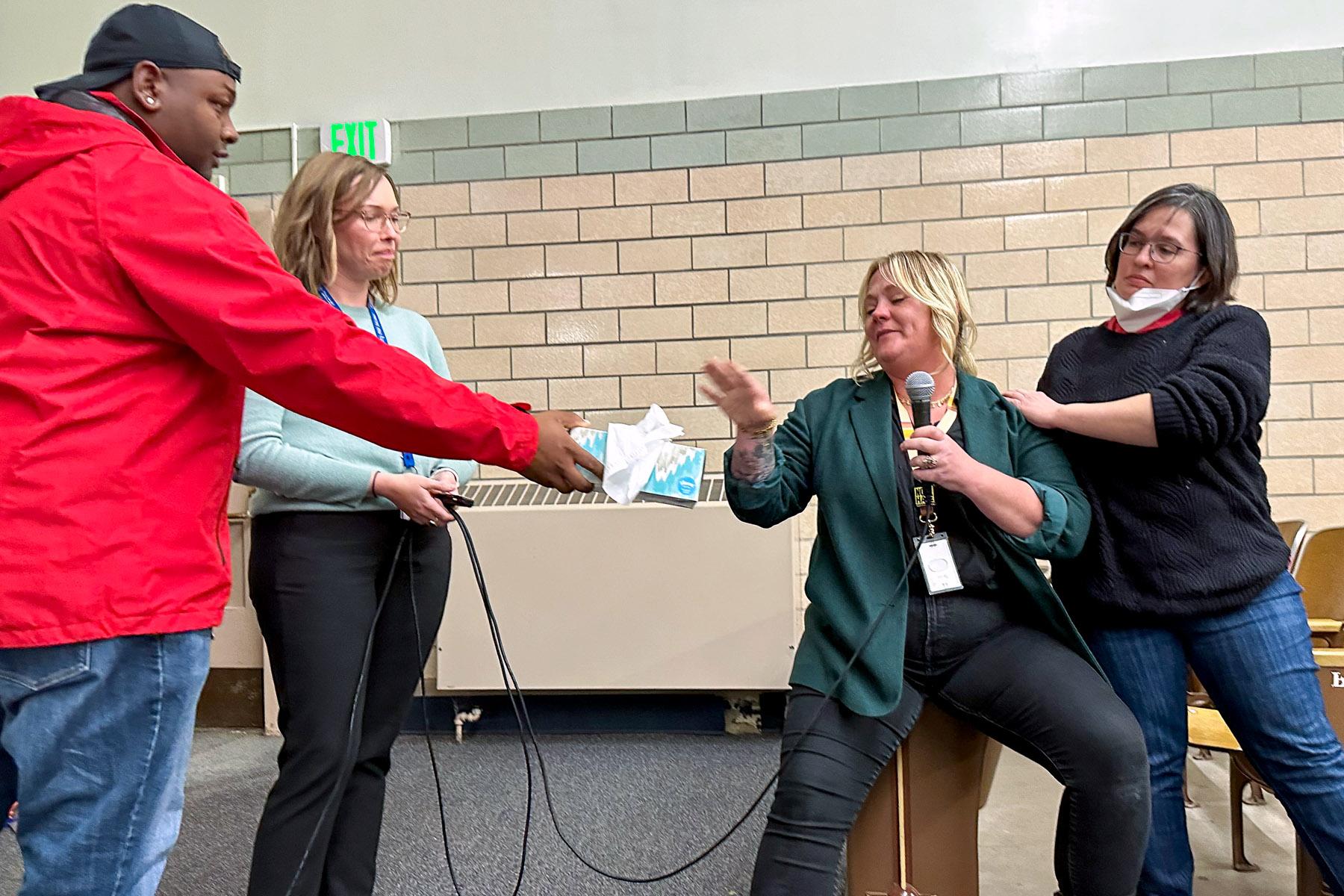
Angelina Epperson’s son didn’t do too well in his old school. He has emotional challenges and needed something different.
Epperson enrolled him in Palmer Elementary, a small school in Denver’s Mayfair neighborhood.
“I can talk to the principal,” Epperson said. “I can go to the special ed teacher and talk to her. And they have all been supportive of my son.”
Her son has friends now, is getting A’s and has fallen in love with playing football.
“He had a game last weekend and his teachers showed up, so they give you that extra love that you’re looking for,” Epperson said. “He was like, ‘My teachers are here! They’re here to watch me!”
So last Monday she was saddened to tell her son that the school may be closing. Palmer is on Denver Public Schools’ list of ten small schools recommended for closure next year.
“He was so hurt,” she said.
Before a final decision, district officials are hosting meetings at each of the ten schools as well as the schools slated to receive the new students.
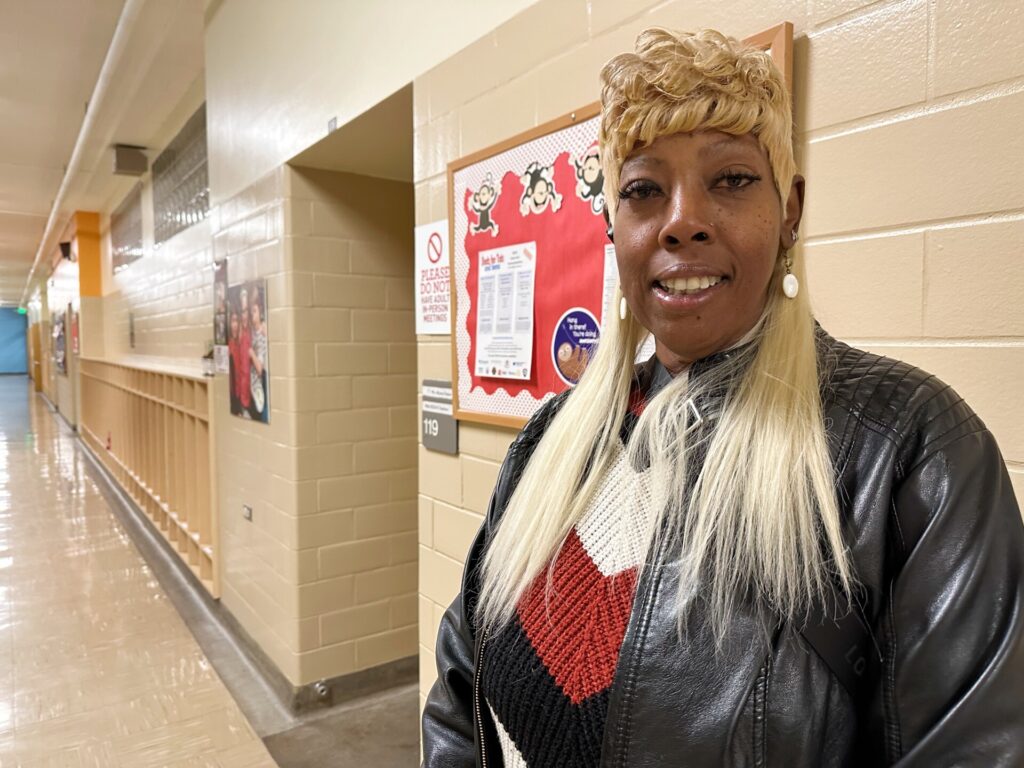
One of the first meetings was Thursday night at Palmer Elementary, where parents were angry, frustrated and sad.
The evening started off politely enough. Board members Auon’tai Anderson, Scott Esserman and Carrie Olson, and a number of district officials were in attendance. Principal Dawn Salter was at the microphone, going through a slide deck explaining why schools are closing. Dramatically declining enrollment has been fueled by an array of factors including gentrification and a gradually falling birth rate.
“Elementary schools, they have declined 6,000 students [since 2014]; for middle schools, the decline is almost 2,000. And projected over the next five years, they’re projecting the decline to be around 5,000 students,” said Salter.
Small schools cost more money through lost efficiencies and limited budgets force hard choices.
“In order to have arts for the children, P.E., music, there’s not enough money in [Principal] Dawn’s budget to pay for that and the district has to pay for that,” explained La Dawn Baity of the district. “We are spending so much money just to keep our small schools open [and] operating at a bare minimum.”
In June, the district’s board of education passed a resolution directing the superintendent to come up with multiple options for school closures, including the pros and cons of each. A school closure advisory committee developed a set of guiding criteria for schools to be considered for closure: those with fewer than 215 students, those with fewer than 275 with projections for continued declining enrollment, along with other equity and safety guidelines. The list produced by that criteria includes eight elementary schools, one middle school and one K-8 school, each with fewer than 215 students.
Denver is not the only Colorado district faced with the prospect of closing schools. Parents in Jefferson County, the state’s second largest district behind Denver, are undergoing a similar process. In both cases, sympathetic elected officials are faced with worried and unhappy parents who are trying to understand why their neighborhood school was singled out for closure.
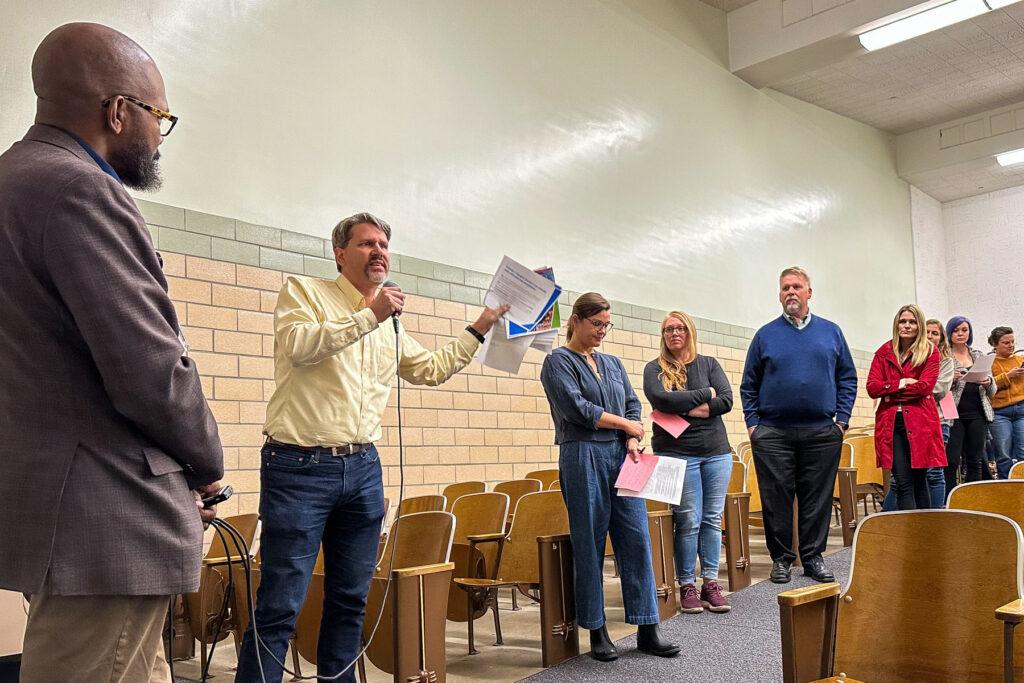
In Denver, parents had lots of questions, but not all of them could be answered — and frustration grew
“If they don’t know the answers to the questions, what’s the point?” said one father. District officials acknowledged that specialized personnel to answer each specific question weren’t in attendance, so the meeting evolved into a lineup of parents taking to the mic to comment. Some cried; others waved documents.
“There is nothing that makes me angrier than being lied to,” said Eric Banner, the parent of two current Palmer students and one graduate of the school.
He said the district just talked about one factor for why the school is on the list: Its enrollment is below 215. Palmer falls short by 10 students, with most of the enrollment decline happening during the pandemic. Its preschool and kindergarten enrollment, which was not part of the count, rebounded significantly last year. Third and fourth grades saw their highest enrollments of the last five years last year, he said.
Parents said the district’s own map shows the Palmer area has an increasing number of children over the past decade.
But Banner said there were other criteria the closure advisory committee laid out that the district should have followed. A big one on the minds of many parents is that students should have a safe walking route and other transportation options to their new school.
Palmer students would have to cross the busy Monaco Parkway to get to the Montclair School of Academics and Enrichment.
“We’re asking kindergarteners and first graders to cross a street that doesn’t have sidewalks, that doesn’t have but a single pedestrian-activated crosswalk button and that one is in the middle of the block far from anything,” he said at the meeting.
Banner sent school board members accident data from Denver Police Department that show for the stretch of Monaco between 6th Avenue and Colfax where children would cross, over the past five years, there were 262 accidents that resulted in police reports. Fifty-two of them were hit and runs.
Parents at the meeting were told that district transportation officials are considering that stretch of Monaco a hazardous crossing so the district will provide bus service.
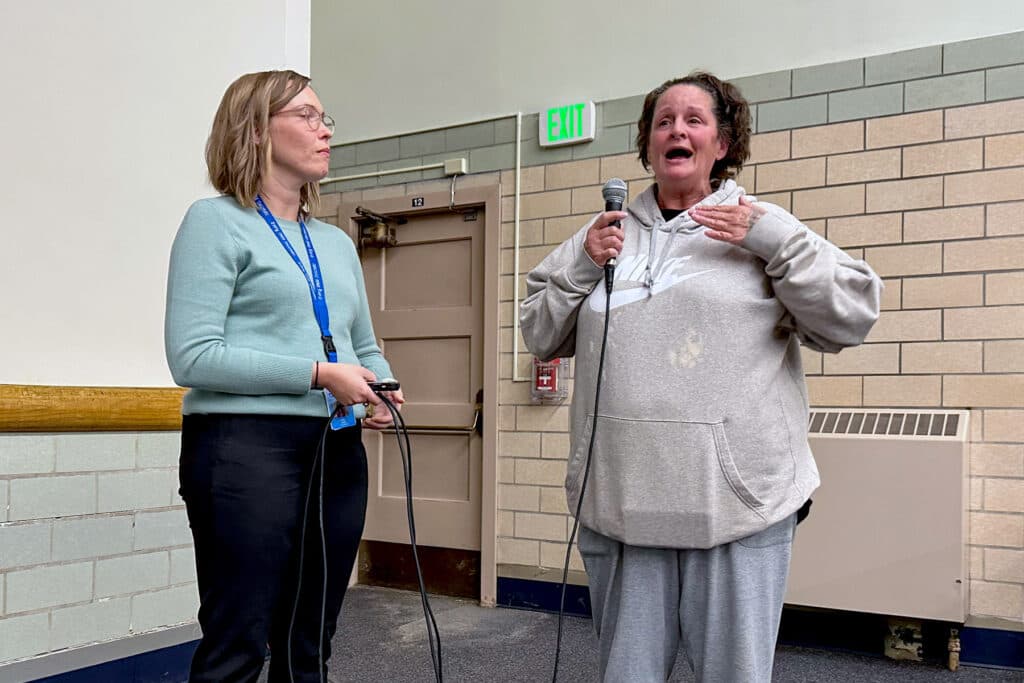
Parents mainly focused on why Palmer Elementary should be spared
Palmer Elementary is the kind of place where Miss Ott gets to meet a family’s dog, and where Miss Martin takes the time to teach a child chess. It’s the kind of school where the bike racks are full because many kids get themselves to school using their own power, and where parent Ashley Lorenz’ daughter with autism gets her needs met.
“The school that we were at previously was not working for us,” Lorenz told the crowd. “It was overcrowded it was too loud, it was impersonal and I am so thankful to be a part of this community."
Lorenz is also a classroom aide at the school.
“I know all of your kids, I know them by name,” she said tearfully.
Palmer Elementary is also one of Denver’s few racially balanced schools, with about 43 percent students of color and 57 percent white. Families live in apartments, condos and single-family homes. Danna Morgan said she chose Palmer because her grandson is biracial and she knew he would be accepted. He’s now excelling and no longer stutters, she said.
“Not all of us have a lot of money, not a lot of us grew up rich, not a lot of us grew up with a silver spoon, and that’s what makes it so special, because we all understand each other,” she said.
Others blamed school choice for fueling the exodus from walkable, integrated neighborhood schools. Parent Erin Engstrom said with a change in Palmer’s principal last year, a group of families left the school for a wealthier school in the Hilltop neighborhood.
“I’d love to know how many of them are white,” she said. “It’s white flight and it screams of white privilege,” she said to cheers.
PTA president Gabby Leavitt said when she sees statistics about families choicing out of Palmer to attend larger schools offering more activities, it’s because their PTAs raise hundreds of thousands of dollars to pay for them.
“Our parents show up,” she said. “We don't have the money, but we are the community that shows up and that needs to be celebrated, not canceled. It is a shame to lose that in DPS.”
What parents were most concerned about was the impact of the closure on children. Parent Jason Somers said that factor wasn’t in the district’s slide show.
“This is a ‘proposal’ but it feels like it’s already been decided, and that’s my question… how do we stop this from happening?” he said to cheers.
The district’s Richard Charles reiterated that no decision has been made.
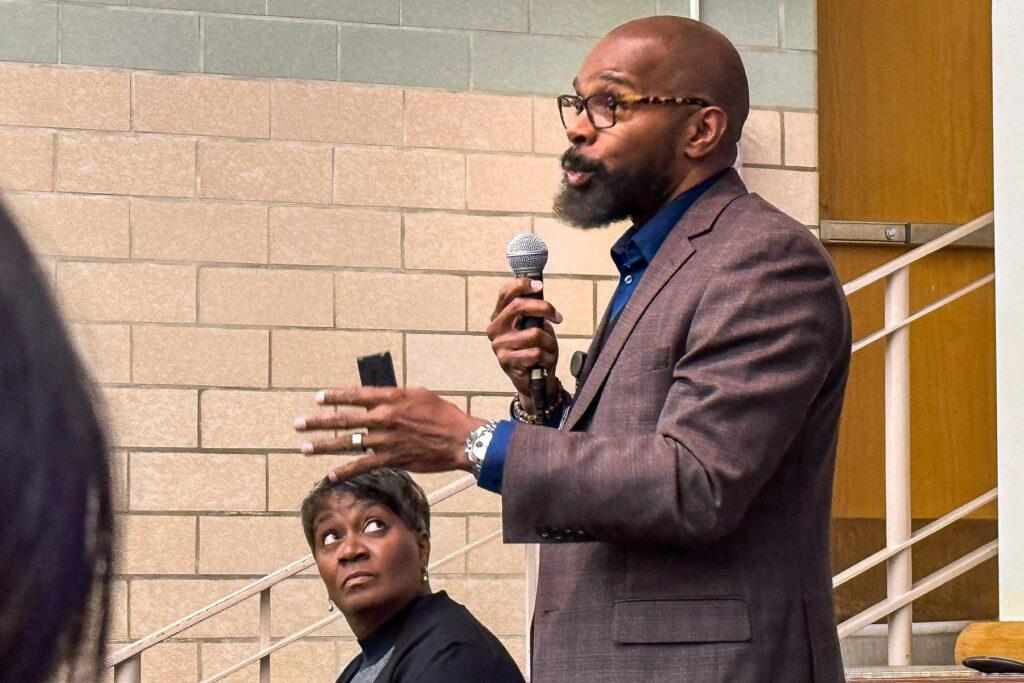
“These board members continue to take under consideration a number of factors because they’re committed to the community,” Charles said.
Parents argued that schools, just coming out of the pandemic, should be given time and support to raise enrollment. They asked the board to consider voting on each school individually, instead of a package.
“As it’s scheduled right now, we’re voting on it as a package but there are some of us who feel we need to separate them out and vote on them individually,” said board member Carrie Olson, who represents the Palmer area.
She came to the meeting to hear families’ personal stories. One mother emailed Olson that her daughter was inconsolable and couldn’t sleep all of Tuesday night after the news broke that her school might close.
“I want this community to know that their voices matter and I am listening and I will take those voices with me to the board seat when I make my decision.”
The public can comment at the school board’s meeting on November 14. The board is scheduled to vote on the school closures Nov. 17.
For now, Angelina Esserman holds out hope that Palmer won’t close. She’s uncertain about where her son will go if the school closes because its teachers and specialized staff are only guaranteed employment at the new school Montclair for the first transition year.
“For him to be the special little kid that he is, it's going be hard for him to start again,” Esserman said. “It's going to be such a hard change for him.”









